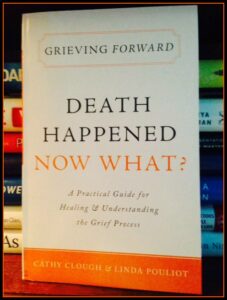Role & Responsibility Change After The Death Of A Loved One

Role and responsibility change does occur after the death of a close loved one because our loved one played many roles in our life. Here’s the thing. Sometimes we have to grieve the loss of the role or roles that our loved one played in our life too.
And when a responsibility change is involved we are either okay with the different responsibilities that we now have to assume—or we are not happy about our new responsibilities. And when we’re not happy about our new responsibilities we have to grieve the loss related to our loved one not being here to take care of things—and at the same time deal with the fact that we are now stuck doing things that we don’t want to do. Feeling scared and/or overwhelmed is normal—and so is feeling angry.
Take a minute and look over the following list and identify the different roles that your loved one played in your life?
Role & Responsibility Change After The Death Of A Loved One: Identifying The Roles
- Best friend
- Lover
- Companion
- Accountant
- Handyman
- Co-Parent
- Stay At Home Parent
- Social Partner
- Social Secretary
- Chef
- Home Maintenance/Yard Care
- Travel Coordinator
- Travel Partner
- Protector
- Mentor
- Income/Financial (If you don’t have a licensed accountant or a financial adviser your credit union/bank manager will help you find one.)
- Emotional Security
- Car Maintenance
- Care Taker
- Other: __________________________________________________________________________________________________________________________
Responsibility Changes
What new tasks have you had to take on? How are you dealing with this change?
_________________________________________________________________________________________________________________________________________________________________________________________________________________________________________________________________________________________________________________________________________________________________________________________________________
Wanted Role & Responsibility Change
Sometimes a role/responsibility change is wanted. For example, maybe you are better at handling the family finances and are gladly taking over. Or maybe your parenting styles were different and it’s more of a relief to parent alone—without experiencing conflict with your spouse… However, when a role or responsibility change triggers more loss for someone there can be more to grieve. This type of loss is known as secondary loss. Blog: Other Factors That Impact Grief
Secondary Loss
Secondary loss is the direct result of a primary loss. And secondary loss is not necessarily less painful or less difficult to navigate and to grieve. In fact, in some cases, for someone, a secondary loss might be more painful and more difficult to accept and grieve than the death of their loved one. This is just what it is. So, if this happens to be your reaction—there’s nothing to feel guilty about.
Additionally, the intensity and duration of someone’s grief experience related to any secondary loss involved with a role and responsibility change—is an individual experience because we all do grief differently. And what is a secondary loss for you may not be for someone else.
Here’s Where Things Can Get Overwhelming
The more roles that your loved one played in your personal life and in your family—the more tasks and responsibilities that your loved one performed, the more secondary loss and grief you will likely feel and need to grieve. And possibly making matters worse:
- Do you now have to assume responsibility for one or more tasks that you never wanted to be responsible for?
- Do you now have to learn how to do new things that you never wanted to have to learn how to do?
When we are overwhelmed with grief it is difficult to even think about having to think about learning something new—or adding more tasks to our daily responsibilities.
Does anything on the following list apply to you?
- I need to learn how to use the washer and/or dryer. This is when a good friend is helpful.
- I need to learn how to use the dishwasher.
- I need to learn how to cook.
- I need to learn how to drive a car.
- I need to learn about vehicle maintenance. Check with your auto shop or dealership.
- I need to learn how to pump gas. This is when a good friend is helpful.
- I need to learn how to be a parent alone. Books/Support Groups helpful.
- I need to learn how our financial investments work. In fact, I need to find out what they are. Which means I need to look for the paperwork in my spouses office or on my loved one’s computer—even though I feel like I am snooping—and look until I find the documents. And then I need to contact our investment agent and set up an appointment to go over the investments—because this is now my responsibility.
- I need to open the mail and pay the bills.
- I need to learn how to do online banking. And I can go to my credit union/bank and find out about all of our accounts—and have the manager show me how online banking works.
- I need to learn how to write a check. Which means that I need to go to my credit union/bank and have the manager show me how to do this.
- I need to learn how to purchase a plane ticket and navigate the airport alone.
- I need to learn how to run/lead the family business.
- __________________________________________________________________________________________________________________________
Healing Insight
Learning something new is overwhelming when we are actively grieving because it’s difficult to concentrate. What also doesn’t help is that grief feels like fear for many of us. Which means being scared and the fact that grief feels like fear can magnify the issue—causing us to make a mountain out of a mole hill. That said, sometimes we have to do things afraid. And always remember this. You are teachable.

Healing Forward Action Step
You are capable. Get your hands on the information that you need to complete the task, look within, imagine a plan and chart a course. Be flexible. Nothing is set in cement. Make changes in your plan when necessary. You got this! Blog: 3 Ways To Recover & Revive When Feeling Overwhelmed by Dr. Caroline Leaf
We wrote this book for you so that you don’t have to figure out and learn things the hard way like we did. This book is all about you healing!

